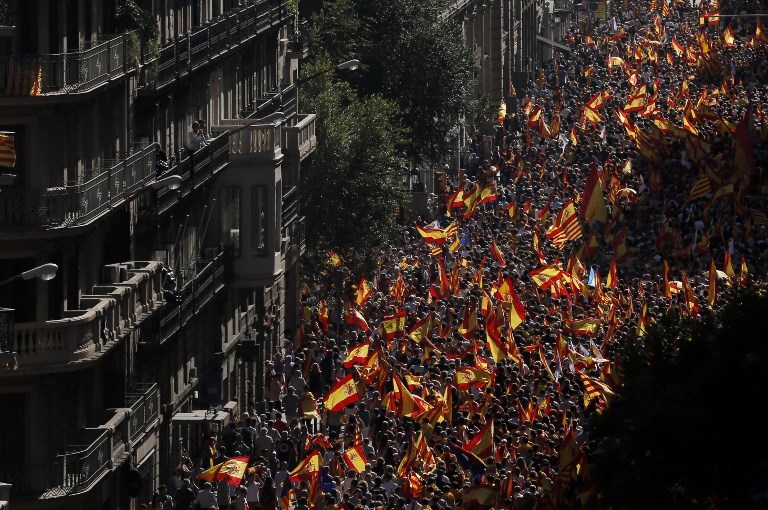
MADRID, Spain — Spain said Thursday it will move to seize some of the Catalan regional government’s powers after its leader warned he could declare independence, escalating the country’s worst political crisis in decades.
The central government in Madrid had given separatist leader Carles Puigdemont until 10:00 am (0800 GMT) on Thursday to say whether or not he was declaring a breakaway state in the semi-autonomous region following a chaotic referendum on October 1.
Prime Minister Mariano Rajoy had warned he would trigger Article 155 of Spain’s constitution — a never-before-used measure allowing it to impose direct rule over the wealthy northeastern region — unless Puigdemont backed down.
There are fears that such a move, allowing Madrid to potentially suspend Puigdemont’s government and take over its police force, could spark unrest in a region where even Catalans who oppose independence cherish their autonomy highly.
Puigdemont responded Thursday that Catalan lawmakers could vote to declare secession unilaterally if Madrid triggers Article 155.
“If the central government persists in preventing dialogue and continuing repression, Catalonia’s parliament could proceed… to vote for a formal declaration of independence,” he wrote in a letter to Rajoy, adding that a cryptic “suspended” independence declaration he issued last week did not amount to breaking away.
The government hit back by saying it intends to push on with triggering Article 155 — a process that would take several days — to “restore legality” in the region.
It called an emergency cabinet meeting for Saturday to specify how it will take control over the region.
The Catalonia crisis has prompted a series of huge street rallies, worried investors and added to the woes of a European Union already grappling with Brexit.
Rajoy was heading to Brussels on Thursday afternon for a summit with other EU leaders, where the Catalonia crisis was likely to come up for discussion.
Divided region
Catalonia’s 7.5 million residents are fiercely attached to their own language and culture but are divided on whether to break away from the rest of Spain.
Puigdemont says his regional administration has a mandate to declare independence from what he says was a 90-percent “Yes” vote on October 1, marred by a heavy-handed police crackdown on voters.
But turnout was given as only 43 percent. Many voters who oppose independence stayed away from a referendum that had been declared illegal by Spain’s Constitutional Court.
Madrid had on Wednesday offered the separatists a potential last-minute way out by proposing fresh regional elections sanctioned by the central government. A government source told AFP that would allow the region to “return to legality.”
But Joan Tarda, spokesman from the leftist ERC party which is part of Puigdemont’s coalition, told lawmakers in Madrid: “The Catalan government will not call elections.”
‘Collective suicide’
Catalonia’s La Vanguardia daily — Spain’s second biggest newspaper — had urged Puigdemont in an editorial earlier Thursday to back down and call elections.
“There’s no dignity in collective suicide, even less so when it’s decided by one person and everyone suffers,” it said in an editorial.
On the streets of Madrid, residents were warily eyeing the prospect of Spain entering uncharted waters with Article 155.
“The 155 scares me,” said Jorge Arias, a 32-year-old librarian who wants Catalonia to stay in Spain but backs voters’ right to have a say on the matter.
“It’s an extreme measure of Rajoy’s government and it won’t solve anything.”
But Alfons Fernandez, a retired engineer, said Rajoy had no choice.
“There is no other way out than Article 155 — if one person wants to talk but doesn’t respect the law, then you can’t talk,” he said.
Pro-independence protesters were due to stage a rally outside central government offices in Barcelona at 1600 GMT.
Economic risks
Separatists complain that Catalonia, which represents about a fifth of Spain’s economic output, pours more into the national coffers than it gets back, and say it would prosper if it went its own way.
But opponents say the region has more clout as part of Spain and that the instability could be disastrous for its economy.
The current standoff is already taking a toll on one of Spain’s most important regional economies.
More than 800 companies have moved their legal headquarters out of Catalonia, citing the risk of instability, while Madrid has cut its national growth forecast for next year to 2.3 percent.








